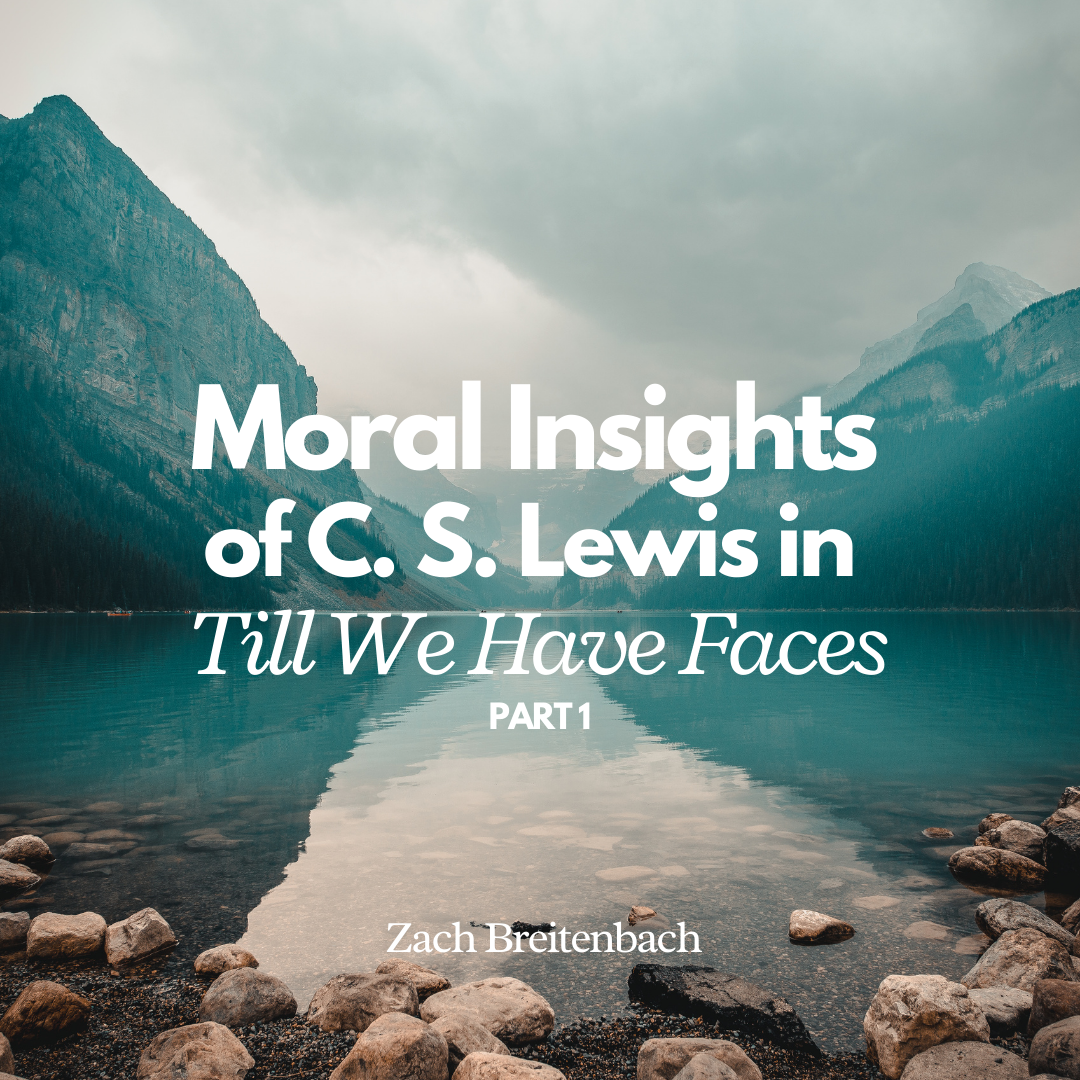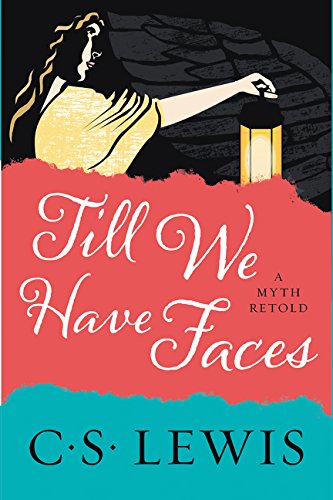After the sacrifice, Orual makes a trek to bury Psyche’s remains but discovers Psyche alive and well, radiant in fact, claiming to be living with her husband/god in a beautiful palace. Orual, though, is unable to see the palace, so she is left to figure out the truth. Skeptical the gods are good, she devises a plan to liberate Psyche, but it goes horribly wrong, sending Psyche into exile. Orual returns home to reign as Queen of Glome and tries to forget her past.
As for aspects of the novel that pertain to the question of epistemology, particularly religious epistemology, first one should note that the era and context of the story is distinctly premodern. The default position is decidedly not atheism, agnosticism, or skepticism, but one of robust religious conviction and theological interpretation of the events in question. Following Robert Holyer, we can immediately identify two major epistemological issues: whether the gods are just inventions of the priest and pandering to popular superstition, or rather that the gods are real. The Fox is of the former opinion, but Orual and Psyche of the latter. The second major epistemological question is this: If the request for Psyche’s sacrifice is genuinely Divine, how is it to be understood? Is it a malevolent request born of jealousy and intended to bring suffering not only to Psyche but also those who love her, particularly Orual? Or is there some paradoxical way in which the deed might result in Psyche’s well-being and therefore be consistent with the affirmation that the gods are good? Orual inclines to the former, always casting the holy places as dark places; Psyche, to the latter.
So a central problem of the novel is to read the signs of the Divine correctly and to find in them reasonable assurance sufficient to live faithfully in the face of the irresolvable mystery and ambiguity featured heavily in the book. Evidence is not undeniable or incorrigible, and questions remain unanswered. A related concern of the book involves Lewis’s most important innovation: Orual’s inability to see the palace of the gods. In Lewis’s key adaptation, Psyche saw it and claimed to live in it, but Orual couldn’t see it at all, except once and only briefly.
Among the various signs and signals of divine reality and goodness, perhaps the most important is the experience of the Holy. Rudolf Otto, author of The Idea of the Holy, claimed that experiences of the Holy are one of the basic sources of religious belief throughout the centuries. He distinguished and described several constituent elements of the experience of the Holy, two of which are these (both found in TWHF): (1) tremendum, a kind of dread or fear unlike our other fears—as Orual rightly describes it, a fear “quite different from the fear of my father,” and (2) fascinans, a consuming attraction or rapturous longing. Psyche is poignantly aware of both, Orual mainly only of the former. Fascinans, or “Joy,” to use another Lewisian term, is associated with the objects of the imagination, with beauty, with poetry, and above all with the Mountain—all common motifs in Lewis’s fiction.
A second sign is empirical evidence, which is ambiguous. A third sign is finding Psyche alive and well days after her sacrifice, which raises the question of how reliable her testimony is. The story Psyche recounts is remarkable, but Orual has to admit that Psyche had always been trustworthy. The final and most difficult piece of evidence is experience of divine realities—like Orual’s glimpse of the palace and Psyche’s more continuous experience of the gods.
The epistemological task in the novel is to determine the nature of ultimate reality—whether it is jealous and cruel, or mysterious and marvelous. Reason plays an important role—drawing conclusions from premises taken from a broad array of experience, but much of the reasoning that Lewis thought is called for is implicit and intuitive, requiring an equal mixture of philosophy and vision, a reconciliation of reason and imagination. Orual has to choose between rival explanations in the face of real ambiguity and mystery, a measure of hiddenness that perhaps ensures that her inquiry reveals her real motivations more than just her cognitive prowess.
Lewis suggests looking within, as part of an epistemic quest predicated on the traditional idea that at the foundation of all knowledge is self-knowledge. Thales thought the hardest thing to do is “to know thyself,” employing a phrase that invokes the specter of what would be on the forecourt of the Temple of Apollo at Delphi. Plato would write that the essence of knowledge is self-knowledge. Centuries before Plato, the Hindu Upanishads confirmed, “Enquiry into the truth of the Self is knowledge.”
In the Apology, Socrates, at the precipice of his own death, asked, “Are you not ashamed to spend so much trouble upon trouble heaping up riches and honor and reputation, while you care nothing for wisdom and truth and the perfection of your soul?” Socrates did not claim to have attained to great wisdom, but the most important knowledge of all, he thought, is self-knowledge. Other speculative matters of alleged knowledge aren’t likely to conduce to greater perfection of the soul than authentic knowledge of the self. And perfection of soul far exceeds in importance anything else, which is why this ancient approach to epistemology, focused on self-knowledge with the goal of moral maturation, resides at the intersection of epistemology and ethics.
TWHF assumes that who we are shapes what we see, but rather than culminating in a radical subjectivism, for Lewis it leads to something like a virtue epistemology, according to which there’s a reality to be seen. Admittedly it’s seen through a glass darkly, but how much of it we can genuinely grasp remains a function of who we are. Understanding who and what we are, then, is foundational to knowledge. For Lewis, poetry—and art more generally—though vitally important, was penultimate, hardly anything like a compensation for lost faith.
In Part II of TWHF, Orual augments her original book—her original complaint against the gods—by writing that “I know so much more than I did about the woman who wrote it.” Interestingly, she says that what began the change was “the very writing itself.” The writing itself—the art—enables the growth in self-knowledge, but this is only the beginning: to prepare her for “the gods’ surgery.” “They used my own pen to probe my wound.” Lewis didn’t think that the epistemic quest was over once we looked within, practiced art, or saw the world under some fresh aspect, but that by growing in self-knowledge we can begin to see the world more accurately, we can apprehend more of reality, and the world will begin to look quite different from how it did before.
Orual had written her complaint against the gods. Ostensibly her complaint is epistemic, but when she adds to the book later, she admits things aren’t as they seem. How does her writing probe her wound and reveal to her the truth about herself? Primarily by a close and brutally honest examination of her various relationships—and the past she has tried so hard to veil. For example, she has had no pity in her heart for her sister Redival, but, after writing her original complaint, she encounters a former servant of her father’s named Tarin, who says, of Redival, “She was lonely.” This catches Orual by surprise, the “first snowflake of the winter I was entering.” She comes to admit as a certainty that she had not thought at all how it had been for Redival when she, Orual, first turned to Fox, then to Psyche, because “it had been somehow settled in my mind from the very beginning that I was the pitiable and ill-used one. She had her gold curls, hadn’t she?”
Next comes insight concerning her treatment of Bardia, her servant whom she loves. He is married, though, and always out of reach. After she finishes her book, she hears he is sick, and within a few days, he dies. She goes to visit Ansit, his widow, but Ansit is bitter toward the Queen, accusing her of working Bardia to death. “After weeks and months at the wars—you and he night and day together, sharing the councils, the dangers, the victories, the soldiers’ bread, the very jokes. . . .” And “I do not believe, I know, that your queenship drank up his blood year by year and ate out his life.”
The Queen replies with incredulity that Ansit should have spoken up, but Ansit says she never would have deprived her husband of his work and “all his glory and his great deeds.” Should she make a child and dotard of him? “I was his wife, not his doxy. He was my husband, not my house-dog. He was to live the life he thought best and fittest for a great man—not that which would most pleasure me.”
Ansit is suggesting that her love for Bardia means she had to give up some of her own desires, not make it all about herself, which begins to prick the Queen’s conscience because this very pattern has always been her own modus operandi. This raises a most important thematic element in the book: a recurring question of what real love means and looks like. Lewis was of the view that we can convince ourselves that our motivation is one of the purest love, when it might be far from it. The point here is that, sometimes when we think we are at our moral best, we may well be at our worst.[su_pullquote align="right"]Lewis, like Kant, saw such moral darkness as powerfully suggestive that it’s altogether rational to believe there are resources beyond our own to close this moral gap. [/su_pullquote]Orual long thought of the gods as indulgent and selfish, and is now accused by Ansit of being “gorged with other men’s lives, women’s too: Bardia’s, mine, the Fox’s, your sister’s—both your sisters.” Now, Orual writes, “the divine Surgeons had me tied down and were at work.” At first she is angry, but then Orual admits to herself that it is all terribly true, more than Ansit could even know. And she confesses her horrific treatment of Bardia, finally concluding, “Did I hate him, then? Indeed, I believe so. A love like that can grow to be nine-tenths hatred and still call itself love.” She adds, “I had been dragged up and out into such heights and precipices of truth, that I came into an air where [her love for Bardia] could not live. It stank; a gnawing greed for one to whom I could give nothing, of whom I craved all.”
Next, she has to reexamine her relationship with Batta, who had been a servant Orual had executed. Now she remembers that Batta had her loving moments. Yes, she was a busybody and tattletale and rumormonger, but now she recalls Batta’s warmth and humanity. Orual is inexorably forced to face the truth of who she was and is and of what she’d done—none of which she wanted to hear, all of which she needed to hear.
Having long thought of the gods as ugly in character, Orual now sees this as projection; now she comes to think that she herself is like Ungit: ugly in soul. In despair, she plans to kill herself before she’s stopped by the voice of a god: “You cannot escape Ungit by going to the deadlands, for she is there also. Die before you die. There is no chance after.” Earlier Lewis availed himself of the Socratic dictum “Know Thyself,” and now Lewis makes reference to the Socratic notion that true wisdom is the skill and practice of death. Reflecting on Socrates, the Queen writes, “I supposed he meant the death of our passions and desires and vain opinions.”
Philosophy, properly understood, trains us how to die, and not just physically. That part of us that most needs to die is our vainglory, our self-aggrandizement, our pride, our inordinate passions. She then reasons, “[I]f I practiced true philosophy, as Socrates meant it, I should change my ugly soul into a fair one. And this, the gods helping me, I would do. I would set about it at once.” The Queen resolves to be “just and calm and wise in all my thoughts and acts; but before they had finished dressing me I would find that I was back (and know not how long I had been back) in some old rage, resentment, gnawing fantasy, or sullen bitterness. I could not hold out half an hour.” She writes, “I could mend my soul no more than my face. Unless the gods helped. And why did the gods not help?”
In her angst and emotional tumult the Queen comforts herself with her complaint against the gods, and with obstinate tenacity holds on to one last consolation. Namely, at least she had cared for Psyche, taught her, and tried to save her, even wounded herself for her. And then comes a vision. In the vision she has a chance to read her indictment against the gods. The book/indictment/complaint has, however, now become much shorter. She is reluctant to read it, but she does, and in fact, without realizing it, reads it over and over again. We can identify three closely related salient highlights.
First, on the evidential score, she admits that she had been shown a real god and the house of a real god and should have believed; the real issue isn’t that. She admits she could have endured belief in the gods if they were like Ungit and the Shadowbrute. In truth she resents their meddling, their wooing of Psyche, their failure to follow through and devour Psyche as promised. “I’d have wept for her and buried what was left and built her a tomb. . . . But to steal her love from me!” The beauty of the gods—the fascinans she’d heretofore resisted and rejected—didn’t make things better, but worse. For it enables the gods to lure and entice, leaving Orual nothing. Second, she’d have rather Psyche remain hers and dead than the gods’ and made immortal. She has prided herself for her profound love of Psyche, but now the truth is revealed: it isn’t Psyche’s well-being she wanted to secure, but her own comfort. Psyche was hers.
Third, Orual insists that had she been the one to whom the gods had made themselves known, she would have been able to convince Psyche of their reality and goodness. Instead it was Psyche made privy, and Orual resented it. “But to hear a chit of a girl who had (or ought to have had) no thought in her head that I’d not put there, setting up for a seer and a prophetess and next thing to a goddess . . . how could anyone endure it?” Orual only wanted Psyche to be happy on terms she dictated. “What should I care for some horrible, new happiness which I hadn’t given her and which separated her from me? Do you think I wanted her to be happy, that way? It would have been better if I’d seen the Brute tear her in pieces before my eyes,” and “Did you ever remember whose the girl was? She was mine. Mine. Do you not know what the word means? Mine!” The sober truth about who Orual is has now been revealed, its dregs poured out. The complaint is the answer. She now has knowledge of herself, and what it reveals is a horrible malady, a problem in need of a solution.
Lightly men talk of saying what they mean. When the time comes to you at which you will be forced at last to utter the speech which has lain at the center of your soul for years, which you have, all that time, idiot-like, been saying over and over, you’ll not talk about joy of words. I saw well why the gods do not speak to us openly, nor let us answer. Till that word can be dug out of us, why should they hear the babble that we think we mean? How can they meet us face to face till we have faces?
The death of most importance in TWHF is not Orual’s physical death in the final chapter, but rather the death to which she’s called after coming into a deep knowledge of herself and her moral malady. When Orual faces who she is, her initial response is one of despair, and rightly so when she sees the distance between where she morally is and where she thought she was, when she sees that at her best she is actually at her worst, when she sees that what she thinks is her love is actually mainly hate. Lewis, like Kant, saw such moral darkness as powerfully suggestive that it’s altogether rational to believe there are resources beyond our own to close this moral gap.
The solution called for in TWHF, however, is radical. What’s needed is nothing less than death—not physical death, though. What philosophy, rightly understood, can teach us is how to die—to experience the death of our moral malady, our self-righteousness, our pride, our predatory natures, our possessiveness, our self-consumption. What such moral desperation reveals is the need for radical transformation—far beyond what we can do on the strength of our own meager moral resources alone. And if we “die before we die,” before it’s too late, as Orual is told to do, then perhaps the sting of death can be removed, its inevitability not entail fatalism, and its aftermath be full of hope. For the longest time Orual had hardened her heart and resisted intimations of something more, whereas for Psyche such a longing constituted the “inconsolable secret” of her heart. Psyche’s longing for the Mountain and the imaginary gold-and-amber castle of her youth, rather than a groundless hope or vacuous wishful thought, was the “sweetest thing” in her whole life.





















